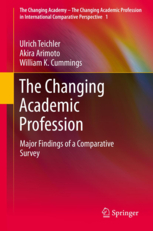

Most ebook files are in PDF format, so you can easily read them using various software such as Foxit Reader or directly on the Google Chrome browser.
Some ebook files are released by publishers in other formats such as .awz, .mobi, .epub, .fb2, etc. You may need to install specific software to read these formats on mobile/PC, such as Calibre.
Please read the tutorial at this link: https://ebookbell.com/faq
We offer FREE conversion to the popular formats you request; however, this may take some time. Therefore, right after payment, please email us, and we will try to provide the service as quickly as possible.
For some exceptional file formats or broken links (if any), please refrain from opening any disputes. Instead, email us first, and we will try to assist within a maximum of 6 hours.
EbookBell Team

4.1
20 reviewsThis book provides an overview on the major findings of a questionnaire survey of academic profession in international perspective. More than 25,000 professors and junior staff at universities and other institutions of higher education at almost 20 countries from all over the world provide information on their working situation, their views and activities. The study “The Changing Academic Profession” is the second major study of its kind, and changes of views and activities are presented through a comparison of the findings with those of the earlier study undertaken in the early 1990s. Major themes are the academics’ perception of their societal and institutional environments, the views on the major tasks of teaching, research and services, their professional preferences and actual activities, their career, their perceived influence and their overall job satisfaction. Emphasis is placed on the influence of recent changes in higher education: the internationalisation and globalisation, the increasing expectation to provide evidence of the relevance of academic work, and finally the growing power of management at higher education institutions. Overall, the academics surveyed show that worldwide discourses and trends in higher education put their mark on the academic profession, but differences by country continue to be noteworthy. Academics consider themselves to be more strongly exposed to mechanism of regulations, incentives and sanctions as well as various assessments than in the past; yet their own freedom, and responsibilities and influence shape their identity more strongly and are reflected in widespread professional satisfaction.